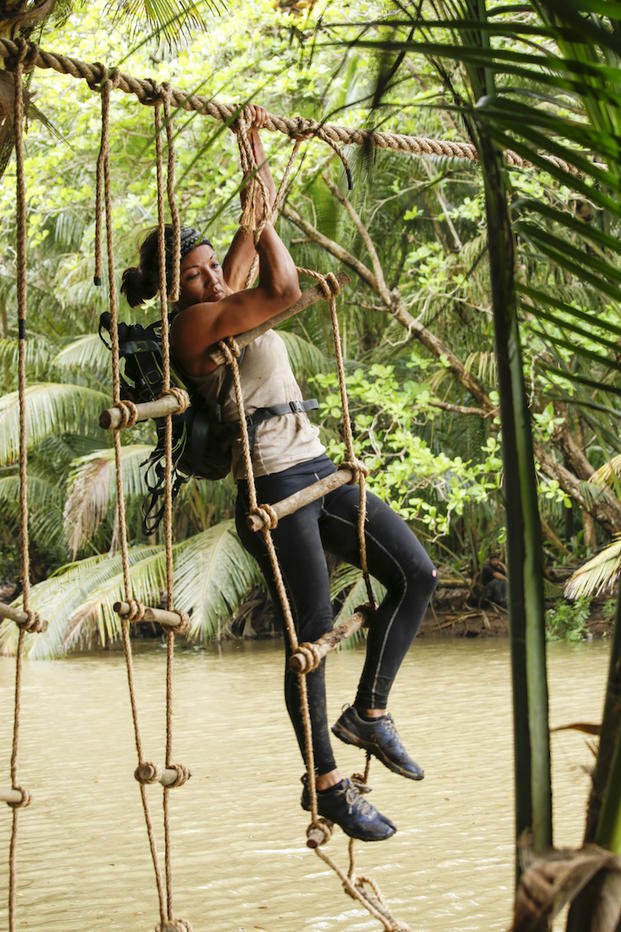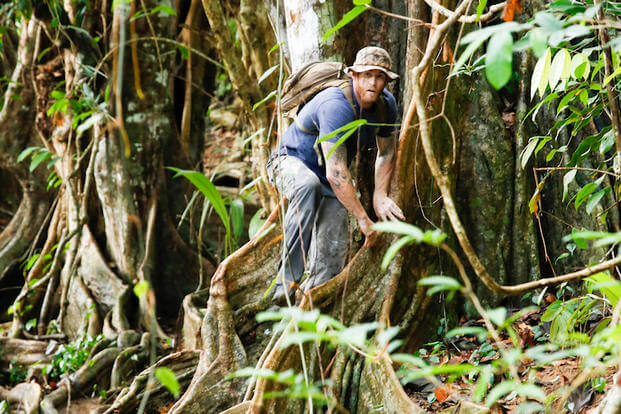It's summertime and that means tons of new competition reality shows. The Discovery Channel premieres American Tarzan this Wednesday July 6th at 10 PM ET/PT and former Recon Marine Tim Reames is one of seven contestants competing for the title.
The show combines physical challenges during the day and leaves the competitors to fend for themselves at night, when they have to use survival skills and live completely off the land until the next round of challenges.
There are four distinct terrains (jungle, coast, mountains and canyons) and the contestants will contend with jungles, raging rivers and climbing. They must forage for their own food.
Tim talked to us about the show, what he's been doing since he left the Marines in 2004 and how he ended up on television.

Tell us what’s going on with “American Tarzan.”
The show is a combination. There’s a running, swimming, climbing, mother nature obstacle course type of competition. Then in the evening, once you finish the challenges for that day, you have to actually survive. You have to build your shelters, get out of the rain, start fire, and gather food.
As time goes on, since you can't open up a refrigerator when you’re hungry, your body starts to slow down without food and appropriate nutrients. It really was kind of a challenge throughout the day, the night, and the whole time we were there.
Talk about your service, how you got into the military, and what you did while you were there.
I joined the Marine Corps right out of high school and then shortly after boot camp and SOI, I went in as a reconnaissance Marine. So I went in for a screening and I passed.
During my time in the Marine Corps, I was at First Recon Battalion in Camp Pendleton, CA. I got out shortly after the invasion in 2004, so I was in from '99 to 2004, and then after that I started contracting for the government from 2004 to 2013.
What did you do when you were contracting?
Contracting was kind of doing the same job, but just for the government instead of the military. So I went all throughout Iraq, all throughout Afghanistan, just about every city that you can think of, Kabul, and all of that. Pretty much anywhere that we had a government agency presence and a military presence, that’s where we would go.
%embed1%
If someone’s looking for a job as they’re transitioning out of the military, how do you get into military contracting?
Fortunately for me, it was brand new in 2003 and 2004. As soon as I got out I had actually had people approach me. There were only a few contracting companies out there: Triple Canopy, Blackwater, DynCorp.
Now there's a bunch of them. I always tell people when they want to get into it, go online and research a couple of them. There are very few that have great backgrounds as far as how much they’ve actually done overseas. Triple Canopy, they’ve been around for 10+ years, Blackwater, they’ve been around for 10+ years. I always try to tell people to go with those.
For people who actually want to get out and start contracting, it is kind of a normal job now that people get into. You can start researching the overseas Middle East jobs on the internet nowadays.
When I first went through, it was all word-of-mouth. Like, oh, you're a recon marine, you went into Baghdad. Now if you Google search a lot of these companies, they’ll actually come up online.

And I’m sure a lot of readers want to know how you get on a show like “American Tarzan.”
I quit the contractor business in 2013, I pretty much got tired of the whole going overseas thing. And then I had some time down. I had applied for a Special Forces competition show a while back and it didn’t happen, but then they contacted me about this one.
These shows actually have talent scouts that'll actually post online about the show, talent searches and things like that. You can actually go online and fill out who you are, give them a little picture of yourself.
With this particular show, they were really looking for people with survival skills. And so being a Recon Marine, I went to SERE School. Before 9/11, that was predominantly jungle training. After 9/11, then it was desert and mountain training. Since I have that experience, that helped get me on the show.
How does being on a show like this compare to the real training?
Well, it's actually funny. On the show, I actually had to do more survival than I actually did in the military. If you’re a recon marine, you're in bad trouble if you have to survive.
As a reconnaissance marine, you're behind enemy lines. When you do survive, you're typically not building a house to let the enemy know where you're at. You do other things, like you stay on the move. For this show, we couldn’t stay on the move and we had to go to checkpoints on the map and set up camp. During the show, I did a lot more survival than I actually did in the military.
In military situations, you're always evading and surviving. The show was a little more structured because they gave you specific points where you had to survive. They were giving you opportunities to gather food without worrying about enemy fire or the enemy finding you.

Let's talk about transitioning, because in a way being a contractor, it’s sort of like you're still in the military. Is that fair to say?
Oh, yeah, definitely.
So now you're done with that. What are you pursuing now? What's your plan for your career for the next 30 years, 40 years?
Right now, I'm a firearms instructor here in Texas. And so I've actually got my TCOLE license, which is a Texas law enforcement firearms instructor certification. So I teach guys – teaching police officers or when people give me a phone call to fly out somewhere. I teach hostage rescue, CQB, a lot of defensive vehicle drills and things like that.
I really enjoy teaching – using the ten years that I spent overseas as a guideline to help other guys learn and perhaps maybe save somebody's life by sharing some of the things that I have been through.




